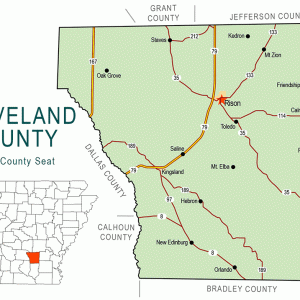calsfoundation@cals.org
Mount Elba (Cleveland County)
Mount Elba, located on the Saline River in present-day Cleveland County, was established in the 1830s and became a thriving southern Arkansas commercial center. The town reached its pinnacle of importance by the 1860s. However, though surviving the Civil War, the town never regained its pre-war status, in part due to the decline of the importance of river commerce in the area.
In 1818, much of the land in southern Arkansas was ceded to the Quapaw, delaying white settlement for many years, but the Treaty of 1824 made that land open to white settlement. By the early 1830s, Mount Elba was established on a rise of high ground on the east side of the Saline River south of the present-day Cleveland County seat of Rison. With the construction of the road from Pine Bluff (Jefferson County) to Camden (Ouachita County) in the 1830s, and the establishment of a nearby ferry by Simeon Goodwin in 1845, a trade center began to develop. Initially called Mark’s Ferry, at some unknown time the name was changed to Mount Elba. Over the years, additional roads were built through the town, connecting it with other areas of the state and thus contributing to growth.
On September 16, 1847, a post office was established with Joseph Meriwether as the first postmaster. In that same year, one of the first private businesses, a grocery store that also sold “spirituous liquor,” was opened by John Van Allen and William H. Cummings. The town slowly developed into a port for small trade vessels on the Saline River.
In 1854, a two-story building was sold to the Temperance Chapel Methodist Church, South. The second floor was used for meetings by the Moore Lodge 96 of the Masons and for local temperance meetings. Sometime in the early 1850s, the Masons also established the Masonic Female College, which remained in operation until Union forces burned the building during the Civil War. It never reopened.
Due to the importance of the ferry and the several roads that passed through, the town had become a hub of commercial activity by the outbreak of the Civil War. Much of the commerce centered around the cotton plantation system, with J. M. Meriwether owning the largest plantation, which was worked by forty-three slaves. Included in the town’s businesses were the ferry crossing, two stores, three doctors, a school, and a blacksmith. The largest business, which employed five workers, was a nearby steam-powered sawmill that produced approximately 600,000 board feet of lumber annually.
After the secession of Arkansas in May 1861, many of the local men enlisted in Confederate military units, including the Second Arkansas Infantry, the Ninth Arkansas Infantry, and the Second Arkansas Cavalry. By 1864, much of southern Arkansas was a no man’s land, with little control by organized forces. The town and many area plantations were virtually abandoned, with the ferry having been destroyed. During the 1864 Camden Expedition, Union forces briefly occupied the town, erecting a pontoon bridge across the Saline River. On March 30, 1864, Confederate forces were repulsed by Union soldiers protecting the bridge in the Action at Mount Elba.
The Mount Elba area was devastated by the war, with land and river commerce at a near standstill. During the war years, much of the livestock was driven off and the land left fallow. However, after the war, the ferry service was restored, and the post office reopened. The town suffered a blow when Dorsey County (now Cleveland County) was created in 1873, and Toledo, a few miles to the north, was selected as the county seat. New development began to gravitate to the county seat of government. The post office was also closed on February 8, 1875, and in 1891, the county seat was moved farther north to Rison, isolating the town even more. Once the railroad was extended into the area in the late 1800s, river commerce became less important, as did the ferry crossing at Mount Elba. The town had little to offer as the importance of the railroad trade quickly replaced that of the Saline River and the roads that passed through Mount Elba.
Though the ferry continued to operate into the twentieth century, the town slowly declined. Today, little remains of the once prosperous town other than the remnants of a levee built by slave labor, a cemetery, and a few residences. There is also a historical marker documenting the 1864 Action at Mount Elba.
For additional information:
Cleveland County, Arkansas: Our History and Heritage. Rison, AR: Cleveland County Historical and Genealogical Society, 2006.
Lisemby, Doris Mitchell. Taproots in Fertile Soil. Arkadelphia, AR: Autumn Years Ministries, 1993.
Mike Polston
CALS Encyclopedia of Arkansas
 Cleveland County Map
Cleveland County Map 




Comments
No comments on this entry yet.